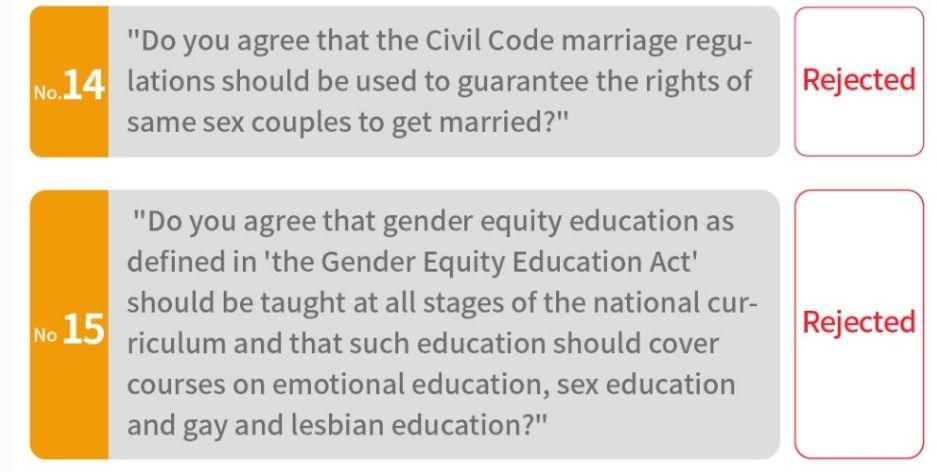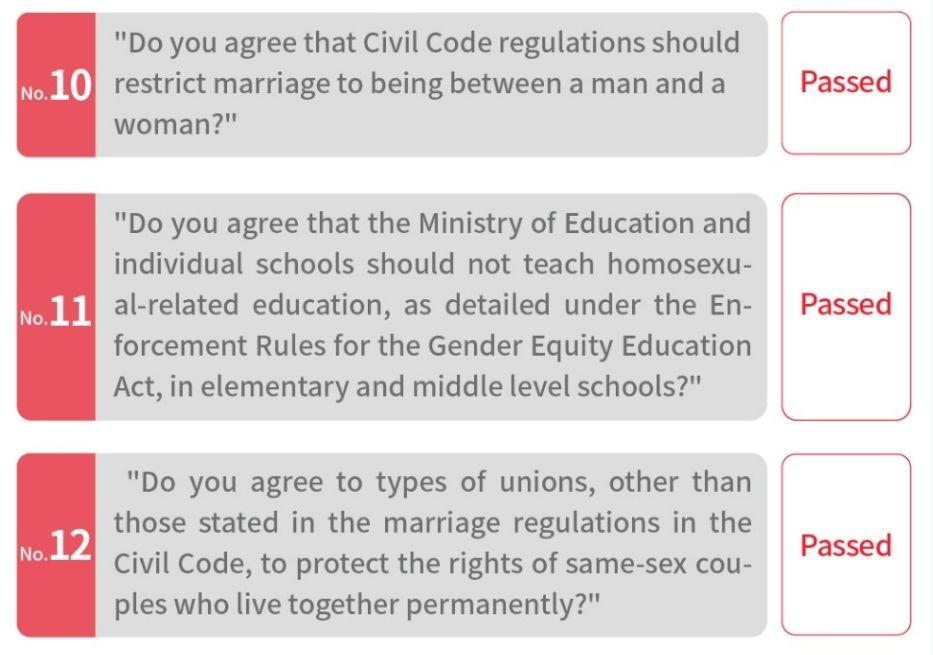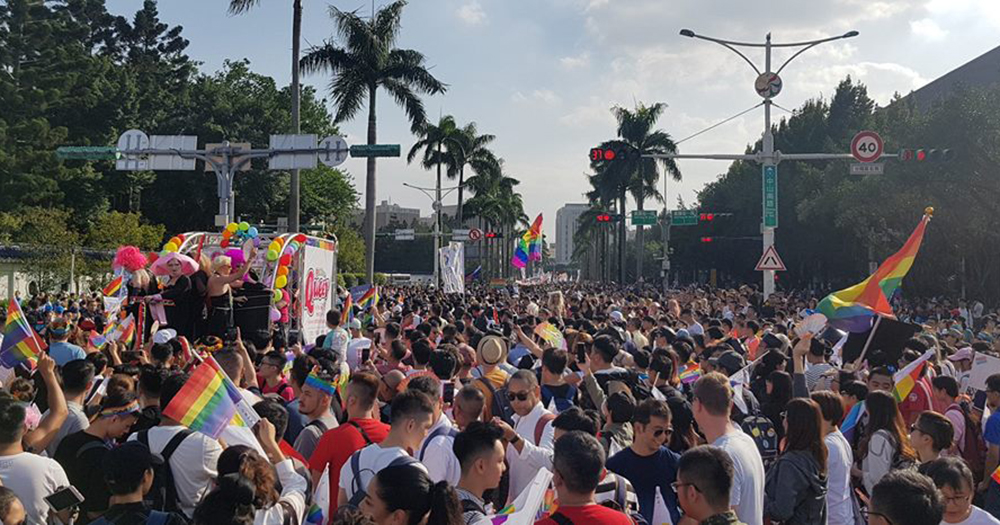Taiwan has rejected legalising same-sex marriage.
Instead, a proposal to have marriage defined under Taiwan's Civil Code as being between a man and a woman has passed.
These outcomes were the result of a referendum on same-sex marriage, held as part of Taiwan's midterm local elections on Nov. 24.
In total, five proposals pertaining to same-sex marriage issues were put up for referendum, with three proposals coming from the conservative camp, and the remaining two coming from the pro-LGBT camp.
All three proposals by the conservative camp have passed with substantial votes for them, whereas the two proposals by the pro-LGBT camp were rejected, with votes against their proposal coming in at almost twice the votes in their favour.
What were the proposals of the referendum?
From the pro-LGBT camp, the two proposals were:
- Allowing the right to same-sex marriage under the Taiwanese Civil Code (Assent: 3,250,165 votes, Dissent: 6,701,859 votes)
- The provision of gender equality education and gay rights education at elementary and middle schools (Assent: 3,373,776 votes, Dissent: 6,560,143 votes)

Screenshot from Focus Taiwan
While from the anti-LGBT camp, the three proposals were:
- Limiting the definition of marriage union to between a man and a woman (Assent: 7,405,586 votes, Dissent: 2,796,697 votes)
- Banning all gay-related education in elementary and middle schools (Assent: 6,867,028 votes, Dissent: 3,306,609 votes)
- Protecting the right of same-sex couples to live together through ways that do not require amending the Civil Code (Assent: 6,201,634 votes, Dissent: 3,944,260 votes)
 Screenshot from Focus Taiwan
Screenshot from Focus Taiwan
The three proposals of the conservative camp were first put forward on Aug. 28, with the other two proposals put forth by the pro-LGBT camp on Sept. 4 in response.
Note that all numbers are taken from the Taiwanese government's Central Election Commission.
Wait, wasn't same-sex marriage already legalised in 2017?
In a sense, yes.
On May 24, 2017, Taiwan's highest court, the Judicial Yuan, had ruled that banning same sex marriage was unconstitutional under Taiwanese legislation.
This paved the way for Taiwan’s laws on the matter to be amended within a window period of two years, by May 2019, either through revising existing laws or enacting new ones.
What's more, as reported by The Diplomat, Taiwanese President Tsai Ing-wen had campaigned in support of same-sex marriage prior to her election as President in 2016.
Tsai had also called for legislation to be passed in a "timely manner" in the wake of the 2017 ruling.
"The law must protect the people's freedom of marriage and right to equality." Full statement from the Presidential Office below: pic.twitter.com/uPXNi6EiwP
— 蔡英文 Tsai Ing-wen (@iingwen) May 24, 2017
Why did it go to referendum?
Mainly because of two factors:
A fall in the ruling party's popularity, resulting in hesitation to push the issue forward
According to The Washington Post, a stagnant economy and political pressure from China has seen a fall in the popularity of Tsai's ruling party, the Democratic Progressive Party (DPP).
As such, this made Tsai hesitant to push the potentially divisive issue forward, resulting in the DPP taking a non-committal stance towards legalising same-sex marriage, despite the May 2017 ruling.
WP added that this was likely a decision taken by Tsai and the DPP in order to secure votes from the conservative older generation living in rural areas for Taiwan's midterm local elections.
Tsai elaborated on her new stance during an interview with Agence France-Presse in June 2018, where she stated:
"Same-sex marriage is also a reflection of the generational gap. In Taiwan, those above 40 tend to have different views to those under 40...We will bridge the differences society holds on this issue in order to propose a comprehensive bill."
Renewed opposition from the conservative camp
Conservative camps renewed their opposition to the legalisation of same-sex marriage.
On Aug. 28, according to The Taipei Times, a group known as the Happiness of the Next Generation Alliance submitted three referendum proposals in a petition to election authorities.
Under Taiwan's referendum rules, referendum proposals are put to the vote if they gain at least slightly over 280,000 signatures, or 1.5 percent of the electorate's support.
The three referendum proposals gathered nearly two million signatures in their petition.
In response, gay rights groups submitted two referendum proposals on Sept. 4 to the election authorities.
Both proposals gained a total of roughly 900,000 signatures.
TT further reported that the Happiness of the Next Generation Alliance also raised over NT$100 million (S$4.4 million) in conjunction with other conservative groups, for an advertising campaign on buses and the front pages of newspapers.
In contrast, gay rights groups were only able to raise NT$8 million (S$355,208) as of Nov. 19.
According to Reuters, spokesperson for the Happiness of the Next Generation Alliance, Tseng Hsien-ying, said:
"Same-sex marriage will change our culture, our family values. Taiwan is not ready for drastic changes."
Tseng added that while they respected same-sex couples wanting to be together, "we want a separate law for them so that we don't redefine our law on marriage which should remain between a man and a woman."
What comes next?
It is unclear.
As further reported by The Diplomat, Judicial Yuan maintains that its decision on allowing same-sex marriage must go into effect in May 2019 regardless of legislative action.
However, the outcome of the referendum means that the Taiwanese government must now somehow reconcile a court ruling in favor of same-sex marriage and a popular vote to reject it.
What's more, the government's position has also been exacerbated by the fact that the ruling DPP has performed poorly at the ballot box, so much so that Tsai has since resigned as chairman of her party.
What else was at stake in the election?
Apart from the referendum on same-sex marriage, Taiwanese also headed to the polls to vote on mayoral candidates for their respective cities.
The DPP lost the vote for its candidates in Taichung and Kaohsiung.
Kaohsiung was a particularly hard hit given that the DPP had been in control of it since 1998.
Several other issues were also put up for referendum as well.
Namely, these were:
- Maintaining the ban on the import of Japanese food products from areas affected by the Fukushima Daiichi nuclear plant disaster (Passed)
- Using the name 'Taiwan' at international sporting events, including the 2020 Tokyo Olympics (Taiwan currently competes under the name of 'Chinese Taipei') (Rejected)
Top photo from Freddie Daw Facebook
Content that keeps Mothership.sg going
???
Here are things S’pore’s public transport workers wish you knew.
??
Are you smarter than a 5th grader Smart Ah Ma?
??
Get arty and impress your date/boss/future mother in law without breaking the bank.
???
This 89-year-old uncle once wandered from Choa Chu Kang to Bedok.
??
"It does not matter how slowly you run, as long as your instagram shots look nice", right?
If you like what you read, follow us on Facebook, Instagram, Twitter and Telegram to get the latest updates.
